Harriet Tubman’s Chosen Home Of Auburn, NY Is Preserving Her Legacy Beyond International Underground Railroad Month
- Oops!Something went wrong.Please try again later.
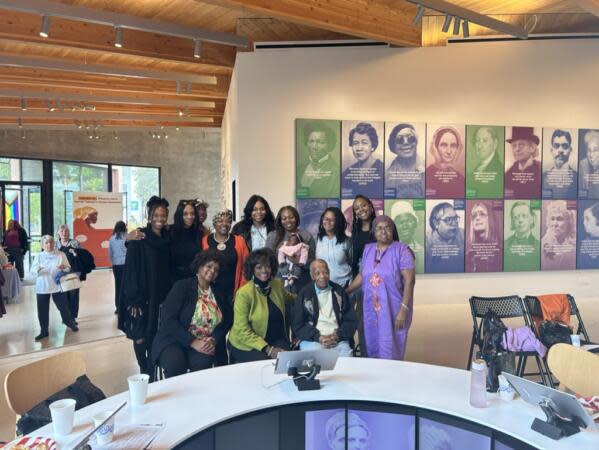
Most people know of Harriet Tubman as an abolitionist, as she was, but outside of her work to free the enslaved, she was, like most Black women, multifaceted. Still, her work as the leader of the Underground Railroad will forever solidify her as a Black American icon and a global one. September represented International Underground Railroad Month. According to the National Park Service, the first month of fall was selected to represent International Underground Railroad Month because it was the month that two of the most well-known freedom seekers and Underground Railroad operatives, Tubman and Frederick Douglas, escaped from slavery.
The idea of an International Underground Railroad Month is relatively new, enacted in 2019, first by the state of Maryland.
Auburn, New York, Harriet Tubman’s chosen home, is amid a significant preservation effort. FAM and the Cayuga County Office of Tourism recently gave an up-close and personal experience of the projects underway, treating Black media to a historical awakening of all things Harriet Tubman with a carefully curated itinerary and tour of sites dedicated in her honor.
Below are a few of the stops attended and key takeaways from those in the area who are involved in the project.
Equal Rights Heritage Center
The first stop was Auburn’s Equal Rights Heritage Center, a hub where New Yorkers organized for various justice reforms. Adorning the middle of the courtyard is a bronze statue of Harriet Tubman — a photo opportunity not to be missed. While there, a few key city leaders spoke about their role in keeping Harriet Tubman’s work alive in the area and their attempts to make it more widespread. Melody R. Smith Johnson, owner of Melody’s, the first Black-owned co-working space in Auburn, provided an overview of everything underway before introducing others involved.
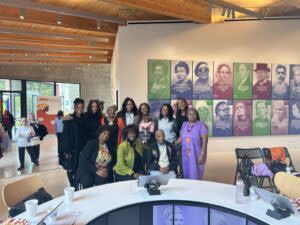
Preservation projects currently include:
The restoration of the AME Zion Church — which hosted the 1913 funeral for Harriet Tubman — Ahna Wilson, superintendent of the Harriet Tubman National Historical Park in Auburn, showed progress via photos of the work done thus far since a lightning fire impacted its structure in 2019. The church’s opening has been delayed until 2024. The National Park Service, which owns the building, says Tubman’s legacy and her descendants are paramount in mind.
Corridor management plan — to track the exact route of Harriet Tubman’s Underground Railroad Route — During the press conference held that morning, Ally Spongr, president of the board of directors for the Underground Railroad Consortium of New York State, discussed the efforts to get the official Harriet Tubman Underground Railroad Corridor designated as a New York State Scenic Byway.
Harriet Tubman’s great-great-great nieces, sisters Adrian Jones Rodman and Michele Jones Galvin, also spoke.
Jones Galvin and their mother, Joyce Stoke Jones, wrote a book, Beyond the Underground: Aunt Harriet, Moses of Her People, the only story told from the eyes of Harriet Tubman’s descendants. The book was 20 years in the making and released in 2013. It seeks to show Harriet Tubman as a woman beyond her abolitionist work.
In front of the beloved statue, Sister Moutique held a libation ceremony, a ritual of pouring a liquid as an offering to a spirit, deity or soul of a deceased person. She allowed all in attendance to honor their ancestors in the process and contemplate what we’re thankful for, reflect on the past and get excited about the future before she led the group in song with a beautiful rendition of “Let My People Go.”
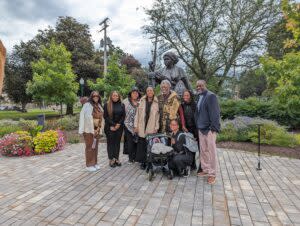
Seward House Museum
Close friends of Harriet Tubman’s, the Seward Family opened their home to fleeing enslaved people as a safe resting place and worked alongside Harriet for other initiatives. It is believed they loaned Tubman money to purchase her home in Auburn. When monthly mortgage payments could not be met due to Tubman’s absence and travel to help the enslaved, she was allowed to stay in the property, and payments were extended. Now a public museum, the Seward House is a designated National Historic Landmark.
Fort Hill Cemetary
Set on a hill overlooking Auburn, Native Americans used this site for burial mounds. As Ted Freeman, the day’s tour guide and the great-great-grandson of two co-founders of Auburn, explained, Black people were not allowed to be buried with their tombstones sitting above ground and flat or not above anyone white buried in the cemetery. Black people were also required to be buried in the “colored section,” per the rules of the times. But Harriet Tubman became the exception to the rule. The cemetery includes the burial sites of notable figures, including Harriet Tubman’s beloved husband, Nelson Davis, and her friend William Seward.
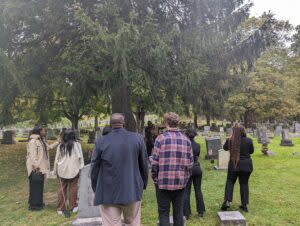
Harriet Tubman’s home
Along with Ted, referred to as Papa Freeman, Brian Muldrow, president of The Muldrow Group, revealed that one of the properties visited on the tour was just discovered to be Harriet Tubman’s home two weeks prior. The house is said to be owned by the AME Zion Church.
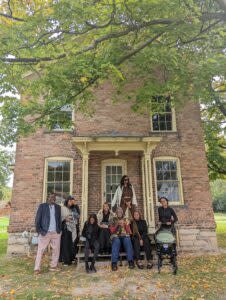
Local Black businesses in Auburn
By the end of the trip, Muldrow provided an overview of Black businesses in the city. The list is impressive for a small metropolitan city like Auburn. It boasts a booming Black business mecca, which Aunt Harriet, whom the people of Auburn affectionately call Harriet Tubman, would be proud of. Below is the complete list via Muldrow:
The Minority Professional Association Board members
Demetrius Murphy, vice president of Lyons National Bank, who coaches minority businesses on creditworthiness
Simone Callender, who runs Fidelis Insurance Care, ensures that minority-owned businesses have the insurance coverage to protect themselves and their employees.
Brick-and-mortar businesses are the heart of downtown Auburn, New York:
Mane and Wigs is setting an example with its second location, offering essential beauty supplies to our diverse community.
Flawless Cuts has become an integral part of downtown with its 10-chair barbershop.
Nate’s Barbers, a cornerstone of this community for 21 years
Muldrow Properties is the first African American-owned building in our city.
Cayuga Drug and Alcohol Testing, a certified minority business, plays a critical role in public safety.
The Muldrow Group’s work in the automotive industry
Bambino’s Pizza shop (Latinx-owned)
Osteria Restaurant (Latinx-owned)
Brick-and-mortar businesses outside downtown Auburn, New York:
Lavish Lounge is a relaxing and charming venue serving delicious authentic Jamaican & American cuisine.
T3 Beauty Supply, a woman and minority-owned business offering beauty supplies
Don Juan’s restaurant has been serving fresh and authentic Puerto Rican food since 1997.
Costa Grande serves the traditional flavors of Mexican cooking with authentic recipes.
The Hideout, a gaming lounge designed to give kids a safe place to play.
McDonald’s, with two locations, one on each side of town, is African American-owned.
Other vibrant businesses
DR Landscaping, a New York-Certified minority and women-owned business
CNY Sports Management Group
RB Entertainment focuses on driving tourism and bringing the best entertainment to Auburn, New York, and Cayuga County.
Sisters Cleaning Service is a woman-owned and minority-owned cleaning service that provides professional and reliable cleaning services for residential and commercial buildings.
Fruity Treats is a woman-owned and minority-owned dessert shop that offers delicious desserts.
